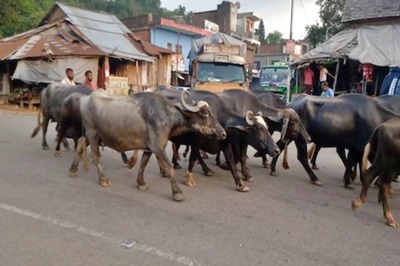‘Keeping Families Small An Act of Patriotism’: Modi Draws Attention to Population Explosion on I-Day

views
New Delhi: Prime Minister Narendra Modi, while speaking at his Independence Day address from the Red Fort on Thursday, took on the issue of "population explosion" and urged the country to work towards family planning, smaller families to ensure that dreams of children get fulfilled.
Modi said, "Today, from the ramparts of the Red Fort, I want to address the issue of population explosion in the country. Parents in India now need to give a serious thought to whether they will be able to fulfill their child's dreams and aspirations and support a new life."
Modi said the issue of ever-rising population is a matter of concern and said, “A small section of society, which keeps their families small, deserves respect. What they are doing is an act of patriotism.”
This is perhaps the first time that a Prime Minister of the country has addressed the issue that has been politically contentious, not just in India but globally as well.
"I want you to do proper family planning and you will naturally see that a smaller family can be happier and more content. Your family will be away from diseases, will have more resources," argued the Prime Minister, adding, "Twenty-first century India needs to understand that development and prosperity begins only when individuals are healthy and resourceful. There are so many illnesses spread that our efforts cannot just be at the government level. We need to go public with our efforts."
In 2017, the United Nation's World Population Prospect had predicted that India's population was set to surpass China in 2024 and projected to touch 1.5 billion in 2030. The 2017 Revision, published by the UN Department of Economic and Social Affairs had said that at the time, China had a population of 1.41 billion, while India had a population of 1.34 billion. India accounts for 18 per cent of the world’s total population, it said. The report had also warned that large and persistent economic and demographic asymmetries were likely to emerge as a result of this.
As per census data, the decadal growth rate has declined from 21.15% in census 2001 to 17.64% in census 2011, while the crude birth rate (CBR) has reduced from 23.1 to 19 and the total fertility rate (TFR) has reduced from 2.6 to 2.2. Meanwhile, the total unmet need has reduced from 13.9 to 12.9 from NFHS 3 (2005-06) to NFHS 4 (2015-16).
In March last year, the minister of state (health and family welfare), Anupriya Patel stated in a written reply to the Rajya Sabha that the ministry had identified India's population growth as a key problem associated with providing healthcare, employment and social security. The government has a number of schemes to address the challenge, including the Mission Parivar Vikas that launched to increase access to contraceptives and Family Planning services in 146 high fertility districts, the introduction of new contraceptive choices such as injectable contraceptives and progesterone-only-pills (POP).




















Comments
0 comment